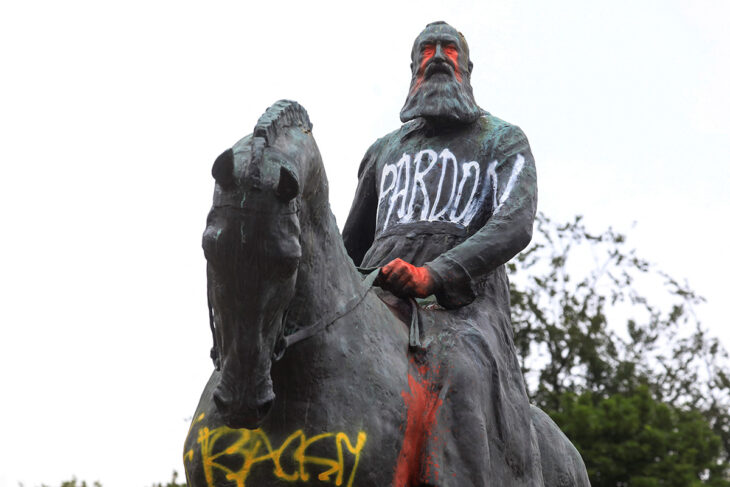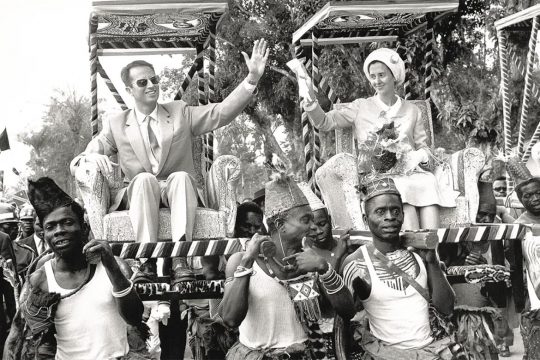After two years of weekly hearings with historians, political scientists, jurists and members of the Congolese, Rwandan and Burundian diasporas, the Belgian MPs on the country’s Colonial Past Commission were unable to agree on the first recommendation emerging from their work: to formulate an official apology for the acts of violence and despoilment that were committed during colonization. This was at the end of 2022, and the announcement created a stir in Belgium.
When it was set up in 2020, this commission was a first in Europe. It had the ambitious objective of shedding light on Belgian domination in Central Africa, with a view to repairing crimes whose existence was practically unquestionable. The Belgian state allowed exploitation of the populations in its colonies, the segregation of mixed-race children, and established structural racism within the administration and education in particular. Expectations were therefore high, especially for the descendants of the Congolese, Rwandans and Burundians who suffered this domination. The feeling of disappointment is quite perceptible among those who testified to the parliamentary commission.
“If we want to build the future, it starts with an apology”
"The question of apologies is so essential that for us it goes without saying," says Geneviève Kaninda, of the “Collectif mémoire coloniale et lutte contre les discriminations” association. She was heard by the commission in December 2021. "About a hundred people from associations and collectives like mine, but also experts in colonial history came to tell the politicians the same thing, namely that the Belgian colonial administration was an eminently and fundamentally dehumanizing system, that there was systemic violation of the human rights of a population, of its culture, of its spirituality. The fact that it was legal at the time does not mean that it cannot be condemned today," she stresses.
Patrick Balemba of the Justice & Peace association agrees. He was heard by the commission in July 2022. "International law has evolved. We must see things differently today," he says. "King Philippe already expressed regrets for the Belgian colonization of the Congo in June 2020 [reaffirmed in June 2022], for the 60th anniversary of that country's independence. Regret or apology, it's the same thing, and to see that there is still a debate about it now, it hurts. While the Belgian authorities of today are not responsible for what happened at the time, there is nevertheless reason to remember. If we want to build the future together, if we want to turn the page, it starts with an apology.
Fear of financial reparations, a false pretext
Why did some commissioners refuse to vote for the final report, which contains all the commission’s recommendations for repairing the mistakes of the past, including an official apology? Because, according to the positions taken by politicians from the Flemish and French-speaking liberal parties and the Flemish Christian Democrats -- i.e., right-leaning parties -- the risk of having to make huge financial reparations was considered too high. This is a false pretext, according to Patrick Balemba. "I was invited to talk about possible symbolic reparations. I was well aware of this fear of having to deal with many financial claims. But I reassured them, explaining that the best reparation is moral, such as supporting the education system in Central Africa, for example through university exchanges," he explains.
"We did not raise the question of reparations," said Liberat Ntibashirakandi, who was heard by the commissioners in December 2021 as a member of a collective of Burundian intellectuals. "What we wanted was for the truth to be told and for responsibilities to be established. This work would have helped Burundi emerge from the cycle of ethnic violence in which it is currently mired. An ideology of hatred has been fostered in the region and is rooted in the colonial past. In short, it was a golden opportunity to give the Burundian people a new direction."
"What the Congolese were asking for, I think, was not compensation, but recognition of the exactions, segregation and violence," says François Milliex, a victim of the segregation of Métis children in the Congo. He was heard by the commission in February 2022, in his capacity as president of the Résolution Métis association. "There is still structural racism against the Métis. It persists in the administration in particular. The most important thing for us is to stop this behaviour. If the commission had been able to advance on the things needed to restore the truth, it’s clear that things would be much easier for us administratively.”
No surprise
While the commission’s failure inspires undeniable disappointment, even anger or a feeling of injustice, these representatives of former colonized peoples don’t see it as surprising. "If the politicians acted in the beginning, it was because there was pressure from civil society in the street after the murder of George Floyd in the United States. We have been making this demand since 2012 or 2013," says Geneviève Kaninda. In other words, there was no real political will to tackle the responsibilities of the colonial past, which are at the origin of a systemic anti-black racism in Belgian society today. "The commission has shown us that this is primarily a political issue, not a historical one," she concludes.
For Ntibashirakandi too, the commission's beginnings suggested little chance of success. "This was already evident in the composition of the group of experts [charged with setting the historical scene before the commissioners' work]. For Burundi, there were no experts, and for Rwanda, questionable experts. And let's be clear, it was Congo that was dealt with. There is only one paragraph about Burundi in the final report," he said. "It was a mistake to refer to the whole of Belgian colonial history. The former colonies should have been examined separately, as they each have their own history. It is a disappointment for us, because we worked. We kept in touch with the commission so that Burundi would be properly associated. It is obvious that it was only diplomatic, political. Belgium wanted to show a willingness to listen, at a time when the racism issue was being raised after George Floyd’s death", but without any real ambition to do the work thoroughly, according to this Burundian mathematician.
Change without politics
For Kaninda, however, Belgium will not be able to avoid facing up to its responsibilities for much longer. "We have gone from a context where the colonial question was not talked about at all to a time when it is talked about on TV shows, in schools, and so on. We would have liked things to advance more. We would have liked to see more progress with the commission, but the debate is taking hold. For reparations and a clear public policy in terms of racism, we will no longer be able to look the other way and say that it will go away. This issue will come back and demand to be tackled. That's why we say to politicians: anticipate, take the initiative, because you can't go back."
The change, if not official, seems to be de facto. Shortly after the commission's work ended without results, access to colonial archives was modified. At the end of February, the House adopted a bill to facilitate access to these archives for the 20,000 or so Métis born during the colonial period to a Belgian father and an African mother. Many of them were taken away from their mothers and placed in orphanages, and are still trying to trace their family members. The new law should, among other things, mean they no longer have to obtain the consent of the people they are looking for (parents, brothers or sisters) before accessing documents that reveal their family members’ identity.







